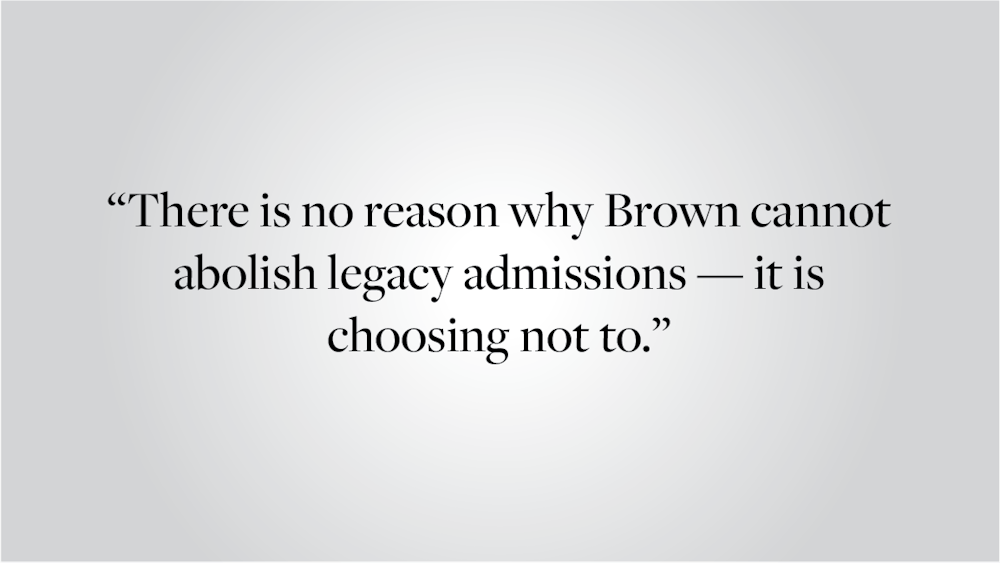The University recently announced a significant expansion of its financial aid program, along with plans to transition to need-blind admission for international students. In the wake of this decision, a Brown education seems more accessible than ever before. And yet, just as Brown makes progress toward a more equitable future, it remains shackled to tradition, privilege and pedigree. Yes, we are talking about legacy admission.
The goal of the University’s recent investment, according to President Christina Paxson P’19, is to ensure “that the University continues to attract the best and brightest students from all over the world.” If Brown is looking for a reason to abolish legacy preference, it can look to the words of its own president. It should ensure that the best and the brightest students all have a good shot at a Brown education, and not a lesser chance than those whose parents are alums. The University’s commitment to accessibility is incoherent.
Why are we bringing up legacy again?
More and more colleges are abolishing legacy admission practices. The justification is simple: Legacy runs counter to values of equal opportunity. Just last month, Amherst College announced its decision to end legacy preference, as have other institutions, such as Johns Hopkins University, in recent years.
Brown can, and should, do the same. The University’s recent expansion of financial aid and admission practices reminds us that we have the capacity to take the bold and necessary steps to widen the Van Wickle Gates. By eliminating tuition for most families making under $125,000 a year, an education here becomes far more accessible to a “missing” middle class. Likewise, need-blind admission for international students will help ensure that a more diverse array of students can get a Brown education.
With these steps, Brown has dramatically reimagined who has access to College Hill. It can certainly take the next step — abolishing legacy.
Legacy admission matters, at least in part, because it has a material effect on the character of College Hill. The administration, somewhat confusingly, often touts the impact legacy has on improving alumni engagement, while also minimizing its impact on admission. The University has stated in the past that legacy considerations are only “tie-breaking” between those of similar backgrounds and do not affect the acceptances of most low-income and first-generation students.
But why should legacy be a factor at all? Apparently, it is because the children of Brown alums grow up immersed in the “values of Brown.” But as this board argued in 2018, this directly undermines the University’s purported goal of accepting students of diverse backgrounds. And at a competitive school where marginal distinctions are often the difference between an acceptance and a rejection, legacy continues to impact the makeup of our student body. According to University Spokesperson Brian Clark, legacy students comprise around 10% of the class of 2025. This is a staggering figure. And even if legacy is used only to distinguish between those of similar backgrounds, it is still concerning that 10% of a class comes from such a small, disproportionately privileged demographic.
Other defenses of legacy look the same, and we’re tired of them. For example, we’ve heard time and time again that legacy boosts alumni engagement, leading to increased donations crucial for supporting low-income students.
But at a school as wealthy as Brown, we can surely abolish legacy without threatening the status of our low-income students. As this board has noted in the past, we don’t foresee an exodus of angry alums causing our coffers to run dry, and studies seem to support that claim, suggesting that legacy preference does not meaningfully affect alumni giving. Amherst College, in fact, announced the abolition of legacy preference directly alongside a financial aid expansion. If an institution truly cares about accessibility, abolishing legacy preference shouldn’t be a radical decision. The choice to uphold legacy isn’t about the budget, but about Brown’s values. There is no reason why Brown cannot abolish legacy admissions — it is choosing not to.
Legacy preference is a statement about who belongs on this campus. For many students, legacy preference is a reminder of the disadvantages they’ve faced on their way here. If our University cares about equal access and what President Paxson calls “community cohesion,” it should remove a practice that divides us by our parental background and clouds notions of meritocracy.
As Brown students, we are frankly tired of talking about legacy preference. Student advocacy against legacy admission, seen recently in a campaign by Students for Educational Equity, reemerges with an almost metronomic frequency as new generations of Brown students arrive on campus and rightfully grow angry at the senseless policy. In 2014, this board argued for the abolition of legacy preference. In 2018, we advocated for full disclosure policies, asking the University to be transparent about how it considers legacy status in admission. Year after year, the University defers any action, instead supplying us with excuses.
Today, we advocate — yet again — for the abolition of legacy preference. No amount of transparency can justify a process that we know is wrong. Today, we know that the University is capable of making positive change; its recent announcement demonstrates just that. Why isn’t it doing more?
—Editorials are written by The Herald’s editorial page board. This editorial was written by its editor Johnny Ren ’23, and members Clara Gutman Argemí ’22, Catherine Healy ’22, Olivia Burdette ’22, Devan Paul ’24 and Kate Waisel ’24.





